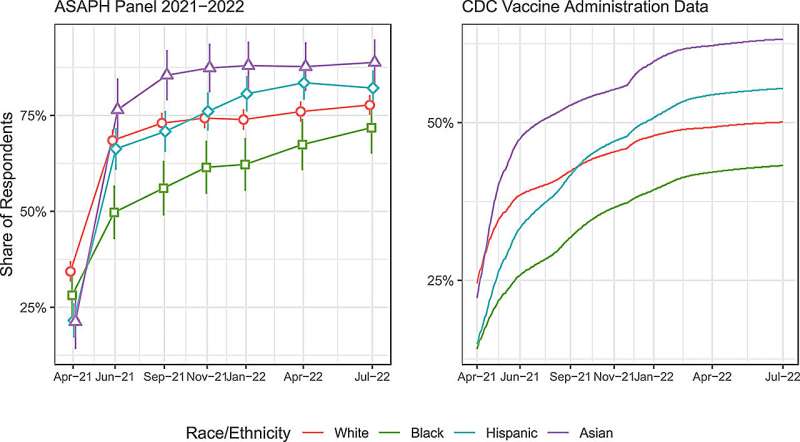This article has been reviewed according to Science X's editorial process and policies. Editors have highlighted the following attributes while ensuring the content's credibility:
fact-checked
peer-reviewed publication
trusted source
proofread
Researchers find knowledge a factor in closing Black-white COVID-19 vaccination gap

Early in the COVID-19 pandemic, Black Americans were more hesitant to take the COVID-19 vaccine than were white Americans. As the pandemic went on, however, the disparity in vaccination rates between Black and white adults declined.
In a paper titled "What Caused the Narrowing of Black-White COVID-19 Vaccination Disparity in the US? A Test of 5 Hypotheses," published in the current issue of the Journal of Health Communication, researchers at the Annenberg Public Policy Center (APPC) of the University of Pennsylvania assessed explanations for the positive change.
Using April 2021 to July 2022 data from the Annenberg Science and Public Health (ASAPH) survey, a national panel of over 1,800 U.S. adults, the team, led by APPC research director Dan Romer, assessed potential explanations, including increased trust in the Centers for Disease Control and Prevention (CDC), exposure to pro-vaccination messages in the media, awareness of COVID-inflicted deaths among personal contacts, and improved access to vaccines.
None of these factors explained the decline in disparity, however. Only increased knowledge about COVID-19 vaccination made a difference. Knowledge about the COVID vaccine among Black Americans increased over time, and this increase was associated with their receipt of the vaccine.
"Black Americans became less skeptical of the safety and efficacy of the vaccine as time proceeded, which appeared in our data to be an important contributor to increased vaccination rates among them," said Romer.
In the initial wave of the survey, in April 2021, Black respondents were more likely to believe various forms of misinformation about COVID vaccines, such as that the vaccines are responsible for thousands of deaths and that the vaccines can change someone's DNA. By the end of the survey period, knowledge about the vaccine among Black Americans had increased significantly.
It is noteworthy that national efforts by Black members of such organizations as the National Academy of Medicine sought to encourage COVID vaccination in the Black community by endorsing the safety and need for the vaccines. Better information about the vaccines also may have been transmitted within the Black community through religious organizations and local Black newspapers that supported the effort to increase vaccination coverage.
These findings could have important implications for future efforts to encourage vaccination, as they suggest that "exposure to knowledge about vaccine safety and efficacy from trusted sources" can matter.
"Reducing misinformation about vaccination for COVID and vaccines in general is a promising strategy going forward, as the risk of infection from COVID and other diseases will not go away," said Romer.
Along with Romer, the authors of the study include APPC data analyst Shawn Patterson Jr., Adolescent Risk and Health Communication Institute director Patrick E. Jamieson, and APPC director Kathleen Hall Jamieson.
More information: Daniel Romer et al, What Caused the Narrowing of Black-White COVID-19 Vaccination Disparity in the US? A Test of 5 Hypotheses, Journal of Health Communication (2024). DOI: 10.1080/10810730.2024.2354360




















